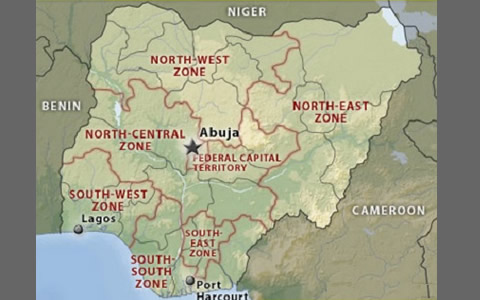On October 1, 2014, Nigerians will celebrate yet another milestone in the history of the country as the nation marks 54th years of independence from the British imperialist. However, a cursory look over the last 54 years of Nigeria’s independence does not offer much to be celebrated as the country has remained a contraption of diverse ethnics locked up in a geopolitical prison.
At 54, Nigeria is still bedevilled by numerous and hydra-headed socio-economic and political maladies. Though recently President Goodluck Jonathan claimed that the country has recorded 50 per cent in poverty reduction, Nigerians only reacted with cynicism as it is very glaring that such a statement is a mere rhetoric and does not portray the reality the of living condition in Nigeria where thousands still go to bed with empty stomach.Talk of moribund educational system,embarrassing unemployment statistics,comatose security sector, escalated party crisis, high maternal and child mortality rate,malignant terror insurgency, ethnic intolerance, corruption,
embezzlement,money laundering, death trap road network,among others,you would find Nigeria right in the picture as all these moral and infrastructure incubuses have characteristically defined the Nigeria polity since independence.
Former President Olusegun Obasanjo, in his 1980 publication, titled: “My Command: An Account of the Nigerian Civil War,1967-1970,” asserts that the present geographical entity called Nigeria was in the olden and precolonial days a conglomeration of violent ethnics and tribes that were interlocked in battles of supremacy. It was from this background of tensile ethnic polarity that Nigeria emerged as a nation in 1914 when Lord Lugard amalgamated the Northern and Southern Protectorates. After the Lugadian amalgamation and in the post 1960 independence era up till today, the battle for supremacy among the Nigerian polarised ethnics still persists as a particular tribe in the nation see leadership of the country as their logogenetic property. Also with the discovery of petroleum in the southern part of the country, some ethnics whose land produce the crude oil clamour for largest chunk of revenue allocation from the oil exploit.
This fight for supremacy and resource control has not only consequently generated a lot of civil unrest and socio-political and economic heat in the country in the last 54 years but has also made the diverse ethnics to neglect common goals and sense of oneness needed to build a flourishing nation. This trend has also produced a crop of leaders who makes ethnic interest their priority rather than the pursuit of common national goals and as a result of this, a crop of followers who lack vital civic orientation and values much needed to build a good nation has also emerged.
Consequently,the country remains a mere geographical expression,a term that has been suitably used by scholars to define Nigeria as nationism rather than nationality. What is connoted by the term nationism is an instance of a large community of people co-habiting the same geographical area but with no sense of oneness or common bonds in terms of general civic values. Thus in nationism, Nigerian citizens, numbering over 170 million, who belong to countless ethnics and tribes and who speak over 500 diverse languages live together in a cat and rat relationship. Even though they physically live in the same nation,they lack a sense of nationality. Therefore, nationism qualifies as a term that accurately describes Nigeria’s current status as one country. This is because despite the fact that Nigerians live in the same nation, there are numerous socio-linguistic, political and economic factors keeping them apart as Nigerians from the diverse ethnics in the country do not have a sense of oneness which nationality connotes.
But as the country celebrates yet another independence day,the question is how soon and possible would She be truly independent and come out of the woods of sectional strife,inter-tribal conflagration, ethno-religious insurgency and other socio-political and economic unrest currently threatening her existence as a national whole? Even though today as a result of her multilingual and multi-ethinic nature, Nigeria remains a giant wobbling on her feet in the journey from nationism to nationality, there is a brighter hope that the country’s tumultuous journey to her nationality will be completed sooner.
The solution to our national problem lies in us. It only requires us to take the simple steps that our founding fathers refused to take. Let us try to know the meaning of a nation and appreciate the characteristics of a true nation.That we live in a multi-ethnic and linguistically diversified nation does not mean we cannot live peacefully together as a people. Let us learn a great lesson from the fact that we are one people created by one creator on one earth under one heaven and appreciate the fact that no human is more human than the other.
Therefore, inculcations of simple civic values and national orientation on the part of individuals will do the job for us all. These include values such as love, honesty,liberty, freedom, human dignity, equality, faithfulness, trustworthiness, integrity, tolerance, contentment,fair play, selflessness, justice, accountability, diligence, transparency, self-discipline, service to one’s community etc. All these and others are what defines us as humans and distinguish us from wild and chaotic animals. All these are the values that make things work better for developed countries of the world. Those in the various leadership positions in our country, in addition to inculcating all these civic values, should also uphold the pillars of democracy, respect for the rule of law and fundamental human rights.
John Osadeyi is a Director of Rescue Research and Development Consult and writes from Ado-Ekiti, Ekiti State.


